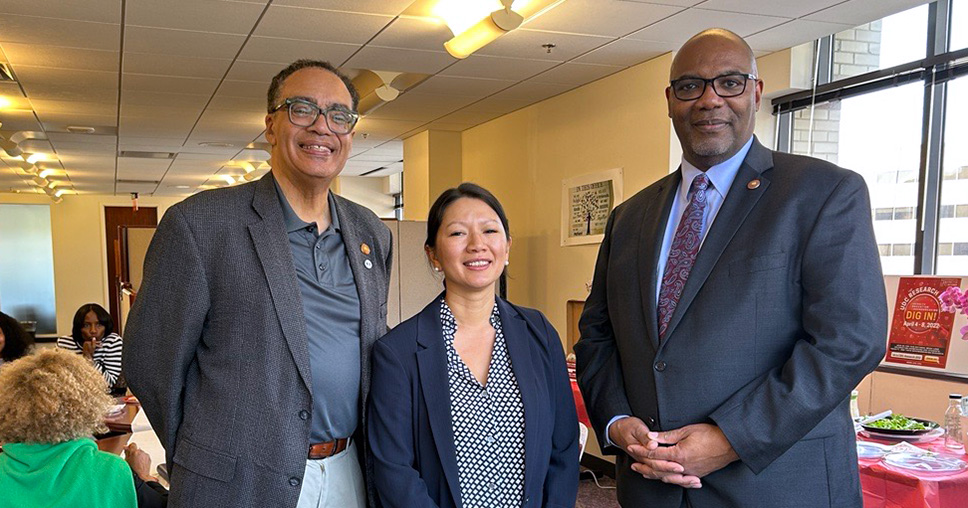
“Let me just say, it has been a great seven years here at the University of the District of Columbia—the people’s university.”
As he concludes his tenure as vice president of research, Victor McCrary leaves behind a transformed institution—one where research and innovation now stand at the heart of UDC’s mission.
When Victor McCrary started at UDC, the charge from then-President Ronald Mason was straightforward and ambitious: elevate UDC’s reputation “not just as a teaching university, but as a teaching and research university.” As McCrary recalls, leadership handed him unusual latitude. “They told me, ‘Hey, look, you’ve got a blank sheet of paper here. Do what you need. Just make sure we don’t end up on the front page of the Washington Post – for the wrong reasons,’” he said, laughing. “‘You don’t have to worry about that.’”
McCrary got to work. He reimagined the Office of Sponsored Programs as the Office of University Research and built teams to support it. He convened an internal research council with representatives from every school to break down academic silos and set common priorities. He also established an external research advisory panel to amplify UDC’s profile, including industry representatives, people from government agencies and academics from some of the bigger schools. “People who have juice,” he says. “They could get out there and say, ‘I know UDC, Vic’s building the research arm, here’s how can we help.’ They were extremely supportive from our very first meeting, and that gave us momentum.”
Recognition quickly followed. “For seven years straight, I nominated faculty members, and they received awards from the Black Engineer of the Year Awards Conference and the Women of Color Conference,” he says. Those wins helped UDC claim its seat at larger tables, since as he likes to say, “If you’re not at the table, you’re on the menu.”
Innovation moved in lockstep. “When I got here, we had no patents,” he says. “People were coming up with ideas, but we hadn’t gone after patents. Now we have six patents secured and six more in progress.”
The result of UDC’s growing effort and recognition, McCrary says, is a culture shift that culminated this year when UDC was designated as a Research College & University (RCU) in the 2025 Carnegie Classification. “To me, that’s the crowning achievement of this journey I’ve had with UDC. Now when you talk about research universities, UDC is in that conversation.”
Even more than honors and awards, a focus on community anchors his view of UDC’s mission. “Our prime goal is to serve District residents,” he says. “How do we get clean water? How do we support workforce development and employers in both the local and federal government and the contracting base? How do we teach people who are on fixed incomes to grow their own food so they can save money? Those are the things we can do that are really important.”
UDC notched several historic firsts under McCrary, among them becoming the first HBCU in the 46-year history of the National Science Foundation to have a faculty member receive the Alan T. Waterman Award. Research Week has grown into a signature university event, and three STEM expos have brought more than 400 students in for hands-on activities and networking opportunities.
The impact on students is always top of mind for McCrary. “The average kid who comes here isn’t a Rockefeller,” he says. “Their last name is Perrone and McCrary and Jones and Williams. They’re not getting a degree just for their parents to hang over the mantle and say, ‘Oh, my kid went to XYZ university.’ They’re coming here to lay a career path, to get the practical skills and education they need for a good job. And research can offer them that.” His shorthand for that philosophy is “blue-collar STEM,” referring to the skilled technical workforce. “It’s about using your hands and your mind to solve problems that will serve and help the community.”
He sees that practical spirit shaping future events. “UDC Research Week 2026 is going to be different,” he says. Instead of organizing by school, the program will showcase university-wide strengths by priority area: for example, AI on Monday, health and safety on Tuesday, and so on. “We’re going to show you everything we do across the university, from research to workforce,” he says. “Funders want to see our university working cross-sectorally.” The format will also deepen outreach to D.C. Public Schools. “You’re interested in AI? Come see what UDC is doing. Meet industry and government folks. That’s how pathways start.”
The data backs the value proposition. Under his leadership, UDC completed its first economic impact study and found, for every dollar the District invests in UDC, the university gives back four, adding up to $435 million in economic impact.
As he departs, McCrary is clear about what he’ll miss. “One thing about UDC: every day, you can make a difference for a first-generation student. You can put a smile on a faculty or staff member’s face,” he says. “I will miss the congeniality, especially with the people who keep UDC running: the janitors, maintenance and housekeeping. They don’t just come for the money; they come for the purpose.”
In the end, he returns to where he started. “It’s been a great seven years,” McCrary says. “Now, when you talk about research universities, UDC is in that conversation. I’m proud to have spread the word, Firebirds.”






